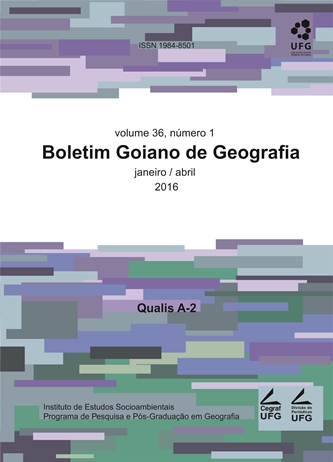IMPLICAÇÕES GEOPOLÍTICAS E GOVERNANÇA AMBIENTAL NA REGULAMENTAÇÃO DA INDC BRASILEIRA - DOI 10.5216/bgg.v36i1.40373
DOI:
https://doi.org/10.5216/bgg.v36i1.40373Resumo
As mudanças climáticas representam uma ameaça para as sociedades humanas e os ecossistemas naturais se tornando uma questão de segurança nas recentes discussões políticas. No entanto, a sensibilização e participação pública, e interesse político variam entre os países membros da Convenção – Quadro das Nações Unidas sobre a Mudança do Clima (UNFCCC). Confrontado com o risco iminente de mudanças, a comunidade internacional necessita repensar questões de ordem geopolítica e governança ambiental cuidadosamente. Este artigo busca avançar o diálogo sobre governança e segurança climática através da análise do processo que levou, no Brasil, à criação da pretendida Contribuição Nacionalmente Determinada (INDC) no contexto das negociações de um protocolo com força legal sob a Convenção do Clima. Com essa abordagem, ao dissecar estratégias de mitigação e adaptação às mudanças climáticas compreendidas a partir de implicações políticas e espaciais, e explorar fatores-chave associados com as percepções públicas, sensibilização, ética, justiça, e de risco. Concluimos que as implicações normativas da regulamentação ambiental brasileira relacionadas ao clima, relações internacionais e geopolítica se interconectam como um ponto de partida para compreendero que está em jogo, a tentativa Brasileira de forjar liderança global em questões ambientais e repensar pressupostos geopolíticos tradicionais.
Palavras-chave: Mudanças Climáticas, Desenvolvimento Sustentável, Comunidade Internacional, Governança Ambiental Global.
Downloads
Não há dados estatísticos.
Downloads
Publicado
2016-03-21
Como Citar
GERMANO FERREIRA COSTA, Carlos. IMPLICAÇÕES GEOPOLÍTICAS E GOVERNANÇA AMBIENTAL NA REGULAMENTAÇÃO DA INDC BRASILEIRA - DOI 10.5216/bgg.v36i1.40373. Boletim Goiano de Geografia, Goiânia, v. 36, n. 1, p. 125–140, 2016. DOI: 10.5216/bgg.v36i1.40373. Disponível em: https://revistas.ufg.br/bgg/article/view/40373. Acesso em: 8 fev. 2026.
Edição
Seção
Artigos











